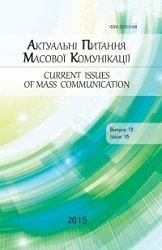Shifts in the Autonomic Nervous System Defined by the Valence of TV News
Shifts in the Autonomic Nervous System Defined by the Valence of TV News
Author(s): Sergii Viktorovich Tukaiev, Yurii Dmytrovych Havrylets, Volodymyr Volodymyrovych Rizun, Maksym Mykolayovych Khylko, Igor Grigorovich Zyma, Mukola Yukhymovych Makarchuk, Evdokia Mykolayivna Reshetnik, Victoriia Ivanivna Kravchenko, Olena Mykolayivna Dolgova, Ivan Valerievich SeleznovSubject(s): Media studies, Cognitive Psychology, Neuropsychology
Published by: Інститут журналістики Київського національного університету імені Тараса Шевченка
Keywords: TV news; autonomic nervous system; heart rate; emotion;
Summary/Abstract: The pattern and nature of autonomic nervous system responses largely depend on the type of emotion. The study was aimed at defining shifts in the autonomic nervous system that accompany the emotional activation under the influence of emotionally accented TV news. Results indicated that a heart rate decelerated in a few minutes after the watching neutral video set. At the same time, throughout the viewing of the video, the activity of the parasympathetic system and the stress index decreased. Negatively accented TV news caused more complex changes. For men, the significant changes in heart rate were recorded only during the first TV news items. On the other hand, negative TV news stories elicited the most significant changes in parasympathetic system and stress index – these changes occurred in the middle of exposure to negative TV news set. The impact was stronger and more complicated for women and consisted of decreasing heart rate while watching TV news stories and accelerating heartbeats in the pause between them. A significant decrease in the parasympathetic system activity occurred after watching negative TV news. Regarding all the parameters, negative TV news stories exerted more significant influence on the psycho-physiological condition of the volunteers than neutral TV stories. Our study revealed the short-term media effects of negative and neutral TV news on the activation patterns of the autonomic nervous system. The short-term reactions of the individual to the mass media are those bricks that underlie a large-scale picture of the media impact on a mass audience. The fact of the existence of short-term media effects gives the base for a further research on the cumulative nature of TV news content’s impact on people, including the longitudinal perspective of media effects.
Journal: Актуальні питання масової комунікації
- Issue Year: 2018
- Issue No: 24
- Page Range: 8-21
- Page Count: 14
- Language: English

